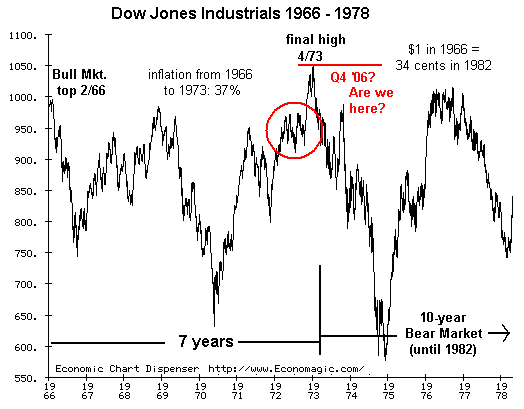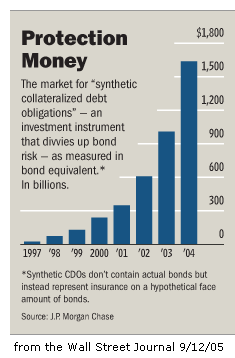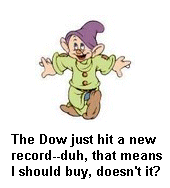

|
| weblog/wEssays archives | home | |
|
Risk, Manipulation and Liquidity (December 8, 2006) As I write this Thursday night, I have no idea what the stock market will do on Friday. But I do know the risks of an implosion are building daily. My own view is that a sharp spike in volatility (i.e. a sudden downdraft in the market) could happen within the next week or so, not months from now. But I tend to be impatient, so I might be completely wrong. I have two reasons to think this: one is short-term, the other is long-term. A few days ago frequent contributor Jed H. sent in this link on a "megaphone top" chart formation which suggests a major market top is in place: The Dow Industrials are Wrapping Up a Pattern Similar to 1929 (11/3/06) Now scroll down to the 12/4 post on Chris Johnston's trading blog ("I Am a Futures Trader," recommended by longtime reader S. Berkland) for his description of the same pattern only on a short-term chart. This suggests a big drop is imminent. 
My longer-term evidence is the book When Genius Failed: The Rise and Fall of Long-Term Capital Management Speaking of the PPT, reader David S. sent in more evidence that a semi-official Plunge Protection Team is intervening in the stock market, not just in times of extreme crisis like 9/11, but routinely--like, say, this month: Government Intervention in Stock Market Is Detailed by New Report, GATA Says 
As for the size of the risk facing global markets: Jed H. also sent in this link to a Bloomberg article which states that global financial derivatives now total a staggering $370 trillion, or 9 times the size of the entire global economy and 30 times the size of the entire U.S. economy: Derivatives Trading Soars to $370 Trillion, BIS Says. Here's a brief summary of risk and liquidity. Liquidity has two meanings in the financial world: when we read about "excess global liquidity," this refers to the vast quantity of cheap (borrowed at extremely low interest rates) money sloshing around the global economy, looking for places to earn a high return. Much of this comes from the now-ubiquitous "Japan carry trade" in which global players borrow yen at 1% in Japan and then swap it into dollars and buy higher yield securities in the U.S. or elsewhere. The other meaning of liquidity is the presence of ready buyers and sellers in the stock market. A stock or market with few buyers and sellers has low liquidity, meaning that when it comes time to sell your shares, there may not be enough buyers to take the shares off your hands. In the reverse case, stocks with very few shares outstanding also have low liquidity, meaning that when you want to buy, and there aren't many shares available, the price can jump quickly as buyers compete for the few shares for sale. This is the classic "short squeeze" in thinly traded stocks, in which desperate shorts (speculators who sold shares they didn't own, hoping to buy them back at a lower price) must buy some shares to "cover" (replace the shares they sold) before the price rises further. Their buying, of course, creates a self-fulfilling prophesy as prices shoot up, which causes other shorts to panic and buy at any price, and so on. The super-hedge fund Long-Term Capital Management blew up in 1998 largely because liquidity disappeared. There were simply no buyers for their tens of thousands of derivative positions (bets). Here's the really pernicious part. As a crisis or market plunge deepens, liquidity (buyers) dries up because nobody is dumb enough to "catch the falling knife," i.e. buy a security which is dropping by the minute, hour and day. But every security must be priced, even if there's no buyer. Let's say I have a derivative linked to, say, a mortgage backed security (bond) made up of high-risk subprime mortgages. In a financial meltdown, investors would realize that these high-risk borrowers will default in droves, driving the value of this bond to near zero. But a derivative isn't the actual security--it's a specialized, thinly traded leveraged bet on the direction that bond will take. Let's say I bought the derivative for $100 a contract. If the bond moved up in price, my contract might double, triple or even quadrupal because it's basically multiplying the actual moves in price by 100. If the bond moves up $1, I make $100. Let's say I want to sell, but there's no buyers. Then the quoted price drops precipitously as the market tries to find buyers. As a result, maybe my derivative is quoted at $50--a loss of 50% for me. I complain, "Hey, this derivative is worth at least $90!" But guess what--nobody cares. The prices is set by the buyers, and if there's no buyers, then the price can drop to near zero. OK, then just hold on to the bet until the panic subsides, right? Good idea--unless you're margined (using borrowed money). When your margin gets called, you have to sell. And when does your margin get called? When the value of your holdings drops below a certain point. And how does the lender set the price of your holdings? By looking at the market. If the market has my derivative set at $50, then my portfolio has taken a huge hit. As a result, my margin/debt gets called, and now I have to sell something to raise cash. This is how illiquidity triggers a feedback loop of ever greater selling. Now I'm in a pickle, because everything I own is dropping. The "geniuses" in LTCM assumed markets were rational, i.e. independent of each other or even random. But markets are linked by human emotions of greed and fear. When one market topples, people panic and start getting out of other markets, too. This is how a house of cards built on $370 trillion in derivatives and semi-official manipulation blows up. 
The Plunge Protection Team has been working overtime this month to keep "the Bull market rally" going, even as insiders have been getting their own money out. When the market finally turns, then we will realize how the PPT manipulation has made things worse: by propping up a sagging market, they've set the stage for an illiquid market: i.e., there's no buyers as markets drop in a free-fall. On 12/4 I posted this link to a CBS-Marketwatch story by Herb Greenberg on the coming drop in the stock market: Market warning from those in the know. What's of particular interest in the context of illiquidity and risk is Greenberg's question about ETFs. ETFs are "exchange traded funds," index or sector funds which are pools of stocks. They are basically mutual funds which are supposedly highly liquid, i.e. can be easily bought and sold on the open market like any stock. In a market downturn, sellers of ETFs will trigger selling in the underlying stocks. When someone sells an Internet ETF, then the ETF has to sell its shares of Google, Yahoo, etc. In a market downturn, who's going to be buying those ETFs? If the answer is no one, then they will add to the selling, creating the negative feedback loop of margin calls and even more selling. Lest you imagine bonds will do swimmingly as stocks plummet, read the links and comments sent in by frequent contributor Albert T.: The most interesting thing so far came from Bill Gross the Pimco bond manager. I think he is saying that bond yields will drop and risk will precipitously increase. Missed him on msnbc today but there was a quip about him saying that yields would go to 2s and 3s long term. Basically stagflation like japan had after its bubble... This is a bit scary. So far he is very very on the money. He said that yeilds would hit 5% and go back down on treasuries and thats basically what happened. Reality Check (by Bill Gross)Maybe the market will run up in giddy euphoria today, or next week, or next month...but maybe not. Please read the book and the above links before you dismiss the idea that a financial meltdown is not only possible but probable. For more on this subject and a wide array of other topics, please visit my weblog. copyright © 2006 Charles Hugh Smith. All rights reserved in all media. I would be honored if you linked this wEssay to your site, or printed a copy for your own use. |
||
| weblog/wEssays | home |